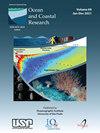{"title":"Co-Designing a safe ocean in the Western Tropical Atlantic within the framework of the UN Decade of Ocean Science for Sustainable Development","authors":"C. V. Hillebrandt-Andrade, Azra Blythe-Mallett, E. Escobar-Briones","doi":"10.1590/2675-2824069.21-027cvha","DOIUrl":null,"url":null,"abstract":"The frequency and intensity of ocean related hazards and its overlapping and cascading effects are escalating with devastating and unsustainable impact on life and livelihoods in the Western Tropical Atlantic. From the Bahamas to Brazil, from Mexico and Central America to the Lesser Antilles, coastal and maritime communities have been impacted by hurricanes, storm surges, earthquakes, sargassum and oil spills along with other climate, weather and human induced events. In addition to the coastal impacts, ocean hazards also have affected the safe and timely delivery of goods and services in a region that is extremely dependent on maritime transport. COVID-19 has compounded even more the situation of millions of people in the region and put extreme pressure on government officials, including disaster management and health professionals as well as the maritime industry. Climate change will only exacerbate the situation. The UN Decade of Ocean Science for Sustainable Development (2021-2030) presents itself as a once-in-a-lifetime opportunity to stop the cycle of disasters with “A Safe Ocean” as one of its seven major societal outcomes. The Western Tropical Atlantic Safe Ocean Working Group was established to co-design and co-deliver with local, national and regional partners transformative strategies that will facilitate and inspire actions to reduce and mitigate the ocean related threats while creating resilient and safer coastal communities and maritime activities. At the core is an Integrated Multi Hazard Ocean Data and Forecast System. Its services would be linked to education, outreach, readiness and communication that empowers and recognizes national and local policy decisions and includes individual response for the protection of life and livelihoods. This effort should support relevant science and strengthen capacity leaving no one or country behind. © 2021 The authors.","PeriodicalId":19418,"journal":{"name":"Ocean and Coastal Research","volume":"1 1","pages":""},"PeriodicalIF":1.0000,"publicationDate":"2021-01-01","publicationTypes":"Journal Article","fieldsOfStudy":null,"isOpenAccess":false,"openAccessPdf":"","citationCount":"3","resultStr":null,"platform":"Semanticscholar","paperid":null,"PeriodicalName":"Ocean and Coastal Research","FirstCategoryId":"89","ListUrlMain":"https://doi.org/10.1590/2675-2824069.21-027cvha","RegionNum":4,"RegionCategory":"地球科学","ArticlePicture":[],"TitleCN":null,"AbstractTextCN":null,"PMCID":null,"EPubDate":"","PubModel":"","JCR":"Q3","JCRName":"MARINE & FRESHWATER BIOLOGY","Score":null,"Total":0}
引用次数: 3
在联合国海洋科学促进可持续发展十年框架内共同设计西热带大西洋的安全海洋
与海洋有关的灾害的频率和强度及其重叠和级联效应正在升级,对西热带大西洋的生活和生计造成了破坏性和不可持续的影响。从巴哈马群岛到巴西,从墨西哥和中美洲到小安的列斯群岛,沿海和海上社区受到飓风、风暴潮、地震、马尾藻和石油泄漏以及其他气候、天气和人为事件的影响。除了沿海地区的影响外,海洋灾害还影响了一个极其依赖海运的地区的货物和服务的安全和及时交付。2019冠状病毒病使该地区数百万人的处境更加复杂,并给政府官员(包括灾害管理和卫生专业人员以及海运业)带来了巨大压力。气候变化只会加剧这种情况。联合国海洋科学促进可持续发展十年(2021-2030年)是阻止灾害循环的千载难逢的机会,“安全的海洋”是其七项主要社会成果之一。西热带大西洋安全海洋工作组的成立是为了与地方、国家和区域合作伙伴共同设计和共同实施变革性战略,这些战略将促进和激励采取行动,减少和减轻与海洋有关的威胁,同时创建有弹性和更安全的沿海社区和海事活动。其核心是一个综合多灾害海洋数据和预报系统。它的服务将与教育、外联、准备和沟通联系起来,使国家和地方的政策决定得到授权和认可,并包括保护生命和生计的个人反应。这一努力应支持相关科学并加强能力,不让任何一个人或国家掉队。©2021作者。
本文章由计算机程序翻译,如有差异,请以英文原文为准。


